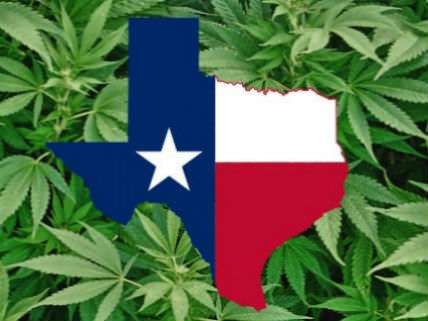Is Support for Marijuana Legalization Stronger in Texas Than in Massachusetts?

The other day a friend in Dallas mentioned that someone he knows suffers from severe chronic pain that is not adequately relieved by narcotics. This guy has thought about trying marijuana but is reluctant because of the stigma attached to it. "I told him it's medical," my friend said. "Not in Texas," I replied.
Texas, like the federal government and 28 other states, does not allow medical use of cannabis, and its marijuana penalties are unusually harsh: Simple possession of two ounces or less is a misdemeanor punishable by up to six months in jail, two to four ounces can get you a year, and anything more than that is a felony triggering sentences of two to 99 years, depending on the amount. Hash penalties are especially severe, with weight cutoffs that equate one gram of resin with 57 grams of buds. Most Texans favor a less punitive approach, according to new polling data. More surprising, the poll found that most Texans support outright legalization. Here are the responses Public Policy Polling (PPP) got in a survey conducted late last month:
"Do you support or oppose changing the law in Texas to allow seriously and terminally ill patients to use medical marijuana for a limited number of conditions if their doctors recommend it?"
Support: 58 percent
Oppose: 31 percent
Not sure: 11 percent
"Under current Texas law, it is a criminal offense for a person to possess a small amount of marijuana, and he or she can be sentenced to up to a year in jail, and fined up to $2,000. Would you support or oppose a change in the law to make it a civil, not criminal, offense to possess an ounce or less of marijuana for personal use, punishable by a fine of up to $100, but without jail time?"
Support: 61 percent
Oppose: 30 percent
Not sure: 9 percent
"The voters in Colorado and Washington changed their laws to allow marijuana to be regulated similarly to alcohol for adults age 21 and older. Would you support or oppose changing Texas law to regulate and tax marijuana similarly to alcohol, where stores would be licensed to sell marijuana to adults 21 and older?"
Strongly support: 41 percent
Somewhat support: 17 percent
Somewhat oppose: 14 percent
That last finding—58 percent support for legalizing the commercial distribution of marijuana—is especially striking in a solidly red state that has favored the Republican candidate for president in every election since 1980. As you might expect, Democrats in the Texas survey were more likely to favor legalization than Republicans (70 percent vs. 48 percent). Yet it is unusual to find even that much support for legalization among Republicans. A January 2013 Reason-Rupe survey, for instance, found that only 35 percent of Republicans wanted to treat marijuana like alcohol. Overall support for legalization in that survey was 53 percent, similar to the findings of other recent national polls.
A PPP survey conducted last month in Massachusetts, a solidly blue state where Democrats outnumber Republicans by 3 to 1, found only 49 percent of respondents thought "marijuana usage should be legal." Is it possible that more Texans support legalizing not only use but also production and sale? I'd like to believe it, but I am dubious.
A few factors may be at work here. The Texas PPP survey, unlike the one in Massachusetts, provided a model for thinking about marijuana legalization by likening it to the rules for alcohol. Judging from the findings of other surveys, this example is powerful enough that support for treating marijuana like alcohol, which entails legalizing production and distribution, is counterintuitively stronger than support for merely legalizing recreational use. Another significant difference is that the Texas survey, unlike the other two, gave people the option of "somewhat" supporting legalization, which presumably boosted the numbers in favor. Furthermore, the questionnaire mentioned legalization in Colorado and Washington immediately before asking about treating marijuana like alcohol in Texas. (The Reason-Rupe poll also mentioned the Colorado and Washington laws, but later in the survey, in the context of federal interference.) While it's not clear whether the Texans who said they "somewhat support" legalization can be counted on to back legislators who favor that policy, the apparent influence of the experiments in Colorado and Washington even in a state as conservative as Texas is encouraging.
[via the Texas Cannabis Report]


Show Comments (104)